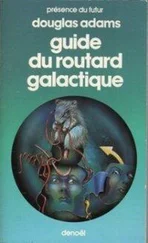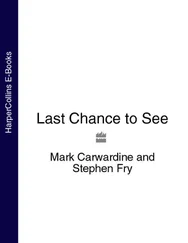Douglas Adams - Last chance to see
Здесь есть возможность читать онлайн «Douglas Adams - Last chance to see» весь текст электронной книги совершенно бесплатно (целиком полную версию без сокращений). В некоторых случаях можно слушать аудио, скачать через торрент в формате fb2 и присутствует краткое содержание. Жанр: Фантастика и фэнтези, на английском языке. Описание произведения, (предисловие) а так же отзывы посетителей доступны на портале библиотеки ЛибКат.
- Название:Last chance to see
- Автор:
- Жанр:
- Год:неизвестен
- ISBN:нет данных
- Рейтинг книги:5 / 5. Голосов: 1
-
Избранное:Добавить в избранное
- Отзывы:
-
Ваша оценка:
- 100
- 1
- 2
- 3
- 4
- 5
Last chance to see: краткое содержание, описание и аннотация
Предлагаем к чтению аннотацию, описание, краткое содержание или предисловие (зависит от того, что написал сам автор книги «Last chance to see»). Если вы не нашли необходимую информацию о книге — напишите в комментариях, мы постараемся отыскать её.
Last chance to see — читать онлайн бесплатно полную книгу (весь текст) целиком
Ниже представлен текст книги, разбитый по страницам. Система сохранения места последней прочитанной страницы, позволяет с удобством читать онлайн бесплатно книгу «Last chance to see», без необходимости каждый раз заново искать на чём Вы остановились. Поставьте закладку, и сможете в любой момент перейти на страницу, на которой закончили чтение.
Интервал:
Закладка:
Towards the end of the evening, Arab mentioned that he hadn't really expected to find a kakapo today at all. They're nocturnal birds and therefore very hard to find during the day. To stand any chance of seeing one at all you have to go and search when there is just enough light in the sky to let you actually see the thing, but when its scent is still fresh on the ground. About five or six in the morning was the time you wanted to go and look for them. Was that OK with us? He stood up and dragged _ his beard to bed.
Five in the morning is the most horrible time, particularly when your body is still desperately trying to disentangle itself from half a bottle of whisky. We dragged ourselves, cold, crabby and aching, from our bunks. The noise of sub-machine-gun fire from the main room turned out to be frying bacon, and we tried to revive ourselves with this while the grey morning light began to seep hideously up into the sky outside. I've never understood all this fuss people make about the dawn. I've seen a few and they're never as good as the photographs, which have the additional advantage of being things you can look at when you're in the right frame of mind, which is usually about lunchtime.
After a lot of sullen fumbling with boots and cameras we eventually struggled out of the door at about six-thirty and trudged our way back out into the forest. Mark started to point out exciting rare birds to me almost immediately and I told him to take a running jump. A great start to a day of virtually unremitting ornithology. Gaynor asked me to describe the scene as we walked into the forest and I said that if she poked that microphone in front of me once more I'd probably be sick over it. I quickly found that I was walking by myself.
After a while I had to admit that the forest wasn't that bad. Cold, wet and slippery, and continually trying to wrench my legs off at the knees with some bloody tangled root or other, but it also had a kind of fresh glistening quality that wouldn't go away however much I glowered at it. Ron Tindal had joined us this time, and was busy striding his way through the undergrowth in an appallingly robust and Scottish manner, but even this ceased to make my head ache after a while as all the glistening began slowly to work a kind of soothing magic on me. Way ahead of us, half-glimpsed through the misty trees, the blue plaid windcheater moved silently like a wraith, following the busy clinking of Boss's bell.
After a longish while of trudging, we caught up with Arab, who had stopped again on a narrow path, and was squatting in the sodden grass.
'There's a fairly recent dropping here,' he said, holding up a soft, dark mottled bead for our inspection. `It's got that white on it which is uric acid, and it hasn't been washed off by the rain or dried out by the sun. That'll disappear in about a day, so this is definitely last night. This is just where we were, in fact, so I expect we just missed him.'
Great, I thought. We could have stayed out a little longer last night, and stayed in bed a lot longer this morning. But the early sun was beginning to glimmer through the trees and there was a lot of fragile beauty business going on where it glistened on the tiny beaded dewdrops on the leaves, so I supposed that it wasn't altogether bad. In fact there was so much glimmering and glistening and glittering and glinting going on that I began to wonder why it was that so many words that describe what the sun does in the morning begin with the letters 'gl', and I mentioned this to Mark, who told me to take a running jump.
Cheered by this little exchange we set off again. We had hardly gone five yards when Arab, who had already gone fifteen, stopped again. He squatted once more and pointed to some slight signs of digging in the earth.
`That's a very fresh excavation,' he said. `Probably last night. Digging for this orchid tuber. You can actually see the beak marks through the bottom here.'
I wondered if this was a good time to begin feeling a bit excited and optimistic about the outcome of the day's expedition, but when I did it started to give me a headache so I stopped. The damn bird was just stringing us along, and it would be another gloomy evening of sitting in the but cleaning our lenses and trying to look on the bright side. At least there wouldn't be any whisky this time because we'd drunk it all, so we would be leaving Codfish the following day clear-headed enough to know that we had flown twelve thousand miles to see a bird that hadn't turned up to see us, and all that remained was to fly twelve thousand miles back again and try to find something to write about it. I must have done sillier things in my life, but I couldn't remember when.
The next time Arab stopped it was for a feather.
`That's a kakapo feather that has dropped,' he said, picking it lightly off the side of a bush. `Probably from around the breast by its being quite yellow.'
`It's quite downy isn't it?' said Mark, taking it and twirling it between his fingers in the misty sunlight. 'Do you think it was dropped recently?' he added hopefully.
'Oh yes, it's reasonably fresh,' said Arab.
`So this is the closest we've got yet... ?'
Arab shrugged.
`Yes, I suppose it is,' he said `Doesn't mean we're going to find it though. You can stand practically on top of one and not see it. The signs are that the kakapo was quite active in the early part of the night, just after we were here. And that's bad news because there was rain during the night, so some of the scent has been washed away. There's plenty of scent around, but it's inconclusive. Still, you never know your luck.'
We trudged on. Or perhaps we didn't trudge. Perhaps there was a bit more of a spring in our step, but as half an hour passed, and then an hour, and as the sun gradually crept higher in the sky, Arab was once more a floating wraith far distant from us in the trees ahead, and then we lost him altogether. The spring had certainly dropped from our step. For a while we stumbled on, guided by the very faint sounds of Boss's bell which were still borne to us on the light breeze sifting through the trees, but then that too stopped and we were lost. Ron was a little way ahead of us, still bounding with rumbustious Scottish gusto, but he too was now floundering for the right direction.
We were clambering over a bank that was thickly covered with ferns and rotten tree trunks, and which led down into a wide, shallow gully in the middle of which Ron was standing, looking perplexedly around him. Gaynor lost her footing as she negotiated the muddy slope into the gully, and slithered down it elegantly on her bottom. I got my camera strap caught in the only branch that didn't break off the moment you touched it. Mark stopped to help me disentangle myself. Ron had gone into bounding mode again and was hopping up the far side of the gully calling out for Arab.
`Can you see them?' Mark called out.
A thought struck me. We were lost because Boss's bell had stopped ringing. The same thought obviously hit Mark simultaneously and we both suddenly called out, `Have they got a kakapo?
A call came back.
Gaynor turned to us and shouted, `They've got a kakapo!'
Suddenly we were all in rumbustious bounding mode. With much shouting and hallooing we clambered and slithered our way hectically across the floor of the gully, hauled ourselves up the other side and down into the next gully, on the far side of which, sitting on a mossy bank in front of a steep slope, was a most peculiar tableau.
It took me a moment or two to work out what it was that the scene so closely resembled, and when I realised, I stopped for a moment and then approached more circumspectly.
It was like a Madonna and Child.
Arab was sitting cross-legged on the mossy bank, his long wet grizzled beard flowing into his lap. And cradled in his arms, nuzzling gently into his beard, was a large, fat, bedraggled green parrot. Standing by them in quiet attendance, looking at them intently with his head cocked on one side, was Boss, still tightly muzzled.
Читать дальшеИнтервал:
Закладка:
Похожие книги на «Last chance to see»
Представляем Вашему вниманию похожие книги на «Last chance to see» списком для выбора. Мы отобрали схожую по названию и смыслу литературу в надежде предоставить читателям больше вариантов отыскать новые, интересные, ещё непрочитанные произведения.
Обсуждение, отзывы о книге «Last chance to see» и просто собственные мнения читателей. Оставьте ваши комментарии, напишите, что Вы думаете о произведении, его смысле или главных героях. Укажите что конкретно понравилось, а что нет, и почему Вы так считаете.







